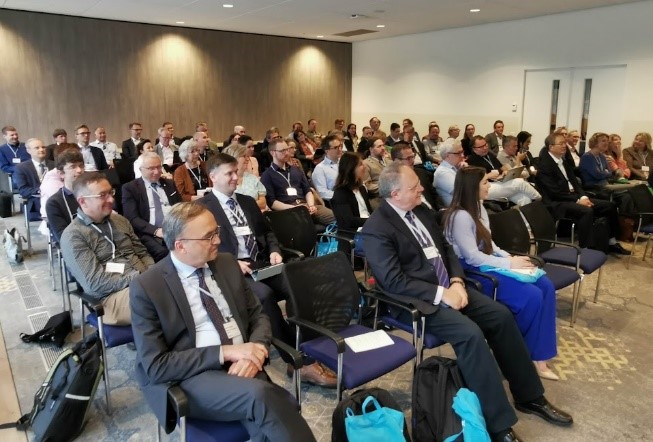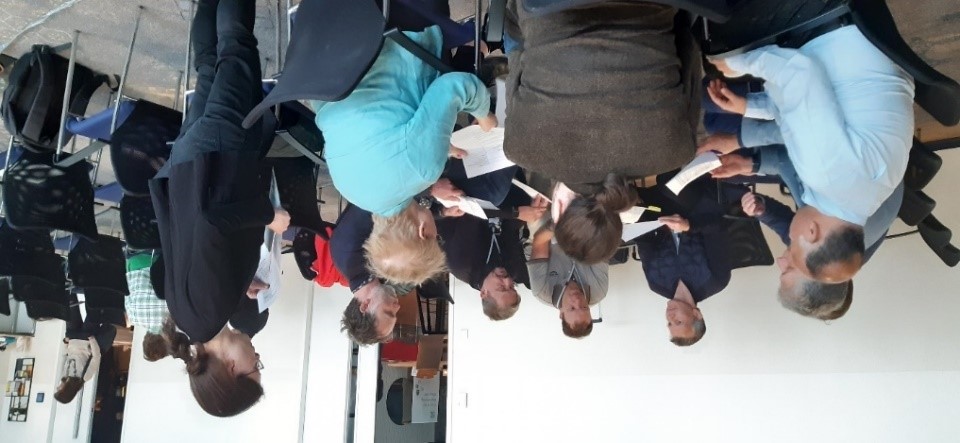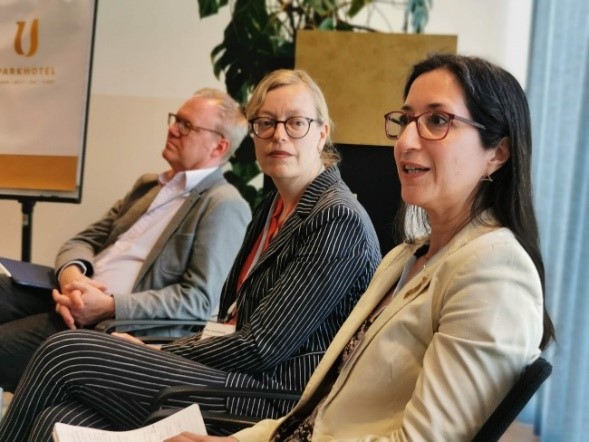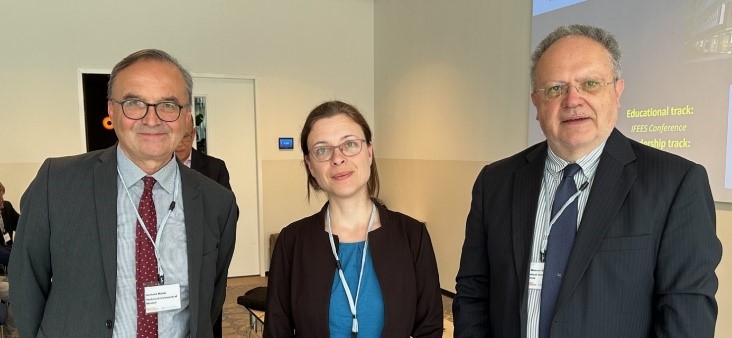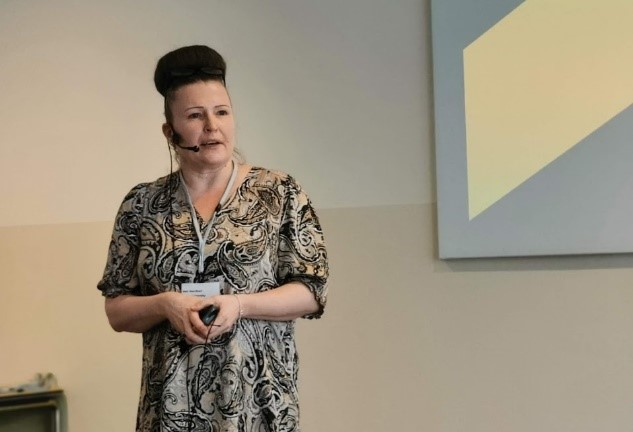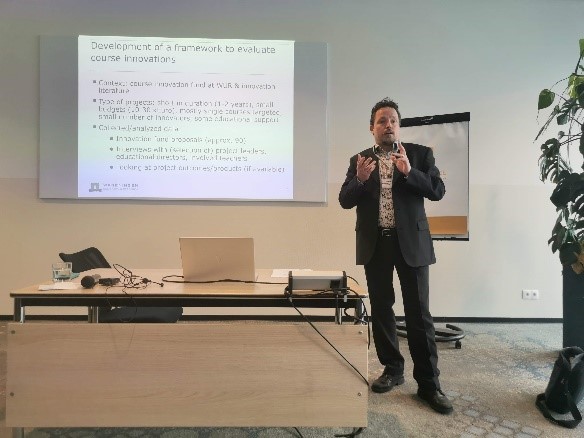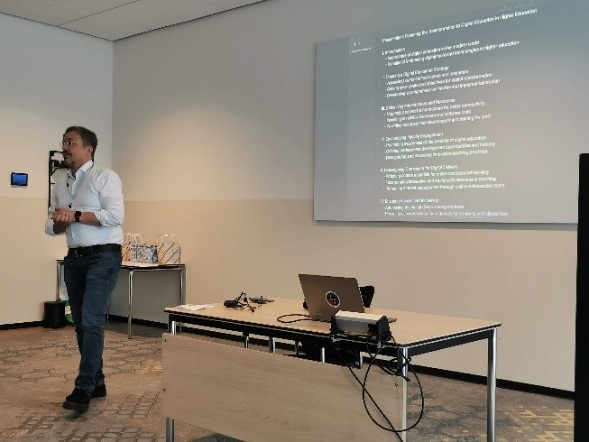Luuk Buunk and Cindy Poortman, 4TU.Centre for Engineering Education
On the 24th - 26th of May 2023, 4TU.CEE organized the European Convention for Engineering Deans on the campus of the University of Twente. We welcomed more than 70 participants from different European countries and beyond in Enschede, to discuss the future of engineering education with a strong focus on digitalization and innovation. The programme included keynotes about vision on engineering and engineering education, digitalization and professional development projects. We also organized discussant panels and workshops about sustainable innovation and leadership.
In the afternoon prior to the convention, Saxion University of Applied Sciences organized a programme with an emphasis on interdisciplinarity and the collaboration with industry. Participants valued the interdisciplinary engineering challenges and cases and student work that were presented.
Industry stakeholder expert panel
In the evening of the 24th, Dr. Balázs Vince Nagy moderated the Industry stakeholder expert panel with panel members Francesco Del Giudice (Swansea University, and McGraw Hill), Guido Schwartz, (Airbus Netherlands), Johan Soderberg, (MathWorks), Sweitze Roffel, (Elsevier) and Xavier Fouger (Dassault Systèmes). Key questions concerned the required (digital) skillset according to Industry for engineering education graduates, the potential for the SEFI community to influence digital transformation for the benefit of both industry and academia, and whether we should be afraid of AI (e.g., ChatGPT). Panel members considered teamwork and collaboration among essential skills for the future and mentioned also the importance of the sustainable development goals for society. Computational skills was also mentioned explicitly, and the ‘future-proof’-aspect of skills was considered crucial, indicating the importance also of lifelong learning skills. Critical thinking is important in academia, but not always valued in the corporate world, according to one of the panel members, which needs to be considered in the interaction between the stakeholders. AI, is, on the one hand ‘highly effective’, and on the other can be used in a bad way as well. We are also still finding out about what it can be used for effectively and in an ethically responsible way, requiring careful and critical thinking.
Digitalization of engineering and engineering education
In the morning of the 25th of May, Aldert Kamp and Marcus Specht shared their visions on digitalization of engineering and engineering education. Aldert Kamp discussed the transformation from a technology-centred society to human-centred engineering, in which data plays a big role. The digital transformation is “massive and intense”, and many digital literacy elements are essential for an engineering curriculum. In human-centred engineering, digital engineering, social responsibility and engineering ethics are central.
Marcus Specht’s presentation was about the how and why of digital engineering education, in which for example datafication, learning analytics, AI, and virtual skills are often concerned. He presented examples, frameworks and models relevant for digital engineering education, including an example of how AI could help provide students with feedback. He included the need for leadership providing resources, vision and need, to create value, as well as the importance of sustained interventions. Recognition in education and professional development cannot be separated from this vision.
After Aldert and Marcus presented their visions, the participants of the conference moved into smaller groups to further discuss the propositions given by the presenters, after which they shared key conclusions in a plenary setting. There seemed to be a distinct interest in what humans can do better than AI and what this means for the future of engineering education. Critical thinking, creativity and ethics were amongst the most stated focus points.
The European University - ECIU
Heli Harrikari subsequently introduced the ECIU consortium and the idea of the European University, in which the University of Twente has taken a strong coordinating role. The aim is to build a European University that is not a repetition of what universities already do, but a flexible organization attempting to maximize impact through a challenge-based approach in a digital and blended setting. Heli emphasized that it is the people who come together to do important work: it is about building a digitally supported community.
Digitalization, 'digital nuggets' and the Dutch Acceleration Plan for educational innovation with IT
In the afternoon a symposium was held with three speakers: Pierre Dillenbourg, Laurent Dairaine and Myrthe Lubbers. Kicking off, Pierre Dillenbourg presented his perspective on digitalization as a strategy for flexibilization of education. Enriching teacher-student interactivity is also one of the main opportunities of digitalization. Moreover, digitalization offers new opportunities for generating data that can help inform management decisions. Laurent Dairaine continued by presenting the idea of ‘Digital Nuggets’; small units of knowledge, taking approximately 30 minutes to complete. By offering a large amount of such Nuggets, students can choose in what direction of a field they wish to develop themselves in. Myrthe Lubbers provided the last presentation of the symposium and shed light on the Dutch Acceleration Plan for educational innovation with IT (Dutch: Versnellingsplan onderwijsinnovatie met ICT). Factors influencing the initiation and implementation of innovations for teacher professional development regarding educational innovation with IT can be categorized in individual factors, institutional factors, the innovation itself and innovation development. Myrthe zoomed into Leadership, to go into essential competences and behaviors, such as working in an evidence-informed way and supporting employee professional development.
Educational leadership
The symposium was followed-up with a panel discussion based on statements and questions posed by the participants of the conference. The panel consisted of John Mitchell, Kim Schildkamp and Esther Ventura and discussed various topics, though most discussions were held around the topic of educational leadership. All-knowing and all-able leaders are not necessarily required, as parts of leadership can also be spread out in different roles of different people. At the same time, this may be perceived differently in different contexts with different cultures.
Nieck Benes and Cindy Poortman summarized the insights of the first day, with main insights and quotes of the presenters and preliminary conclusions and questions for further discussion. After a campus tour guided by students, Perry den Brok briefly explained the history of the co-organizing 4TU.Centre for Engineering Education at the start of the conference dinner.
Frameworks for educational innovations
In the morning of the 26th of May, Perry den Brok and Cindy Poortman hosted workshops about frameworks to think about educational innovations and sustaining these. Perry explained a study into evaluating course innovations at his university. The evaluation framework presented offers an overview of indicators, criteria and variables to map the intended innovation, including, for example, the goal of the innovation, its learning domain and the dissemination strategy. Cindy presented the factors influencing sustainable (lasting) educational innovation, of which leadership is an important one. Zooming into leadership, sub factors such as vision and goals, support, and being knowledgeable were addressed. In this presentation a leadership framework was presented that can be used as a discussion and reflection tool to support innovation processes.
Although some participants felt that open-ended innovation processes might also be valuable, others thought it was useful to see innovation from a broader perspective of leadership, organizational and intervention factors.
Twelve Thoughts of Twente
Gerhard Müller and Luis Manuel Sánchez Ruiz, as (SEFI) council co-chairs, provided their wrap up of the convention suggesting Twente Thoughts about joint vision, transformation, leadership, digital formats and content, for example. Thoughts that need to be further addressed (see also below) are about “great individuals versus scaling up/how to steer innovation”; “flight level of goals” versus achieving innovation, and providing related resources and support; “critical thinking versus leadership cultures”, and “AI in education versus (EU) AI regulations”, to name but a few.
Twelve thoughts of Twente raised at ECED 2023
1. We need to transform from technology-centred society to human-centred engineering.
2. Digitalization is not about the system, but about the people coming together to do great things; digitally supported communities.
3. Digitalization and coming to campus need to be combined to support flexibility, teacher-student interactivity, diversity in student need, and data-informed decision making.
4. Digitalization can support delivery control, compatible with flexible and adaptive learning paths with learning analytics.
5. Leadership providing resources, vision, and need is required for sustained interventions, for enabling leadership to create value.
6. Leaders as role models, participating actively in innovation, supporting networks and communities, and working in an evidence-informed way, leading themselves and others, can accelerate digitalization positively.
7. Communities and networks, relationship-building, and data-informed decision making help the transformation to human-centred engineering in the digitalization era.
8. AI in education versus (EU) AI regulations can be challenging.
9. Critical thinking versus leadership cultures can be a dilemma.
10. How do we scale up/steer innovation from great individuals to the broader context?
11. How do we practically achieve innovation from a “Flight level of goals” and provide related resources and support?
12. Should everything be combined in the engineer and the leader? Do we keep needing more? Or is it also time to develop boundaries, work together with others and distribute leadership more?
We thank all SEFI co-organizers, sponsors and 4TU.CEE, speakers, chairs and panel members, and of course the participants for their contributions!
The next edition of the SEFI Deans Conference will take place in 2024 at the University of Sheffield. We are very much looking forward to continuing our discussions there.




